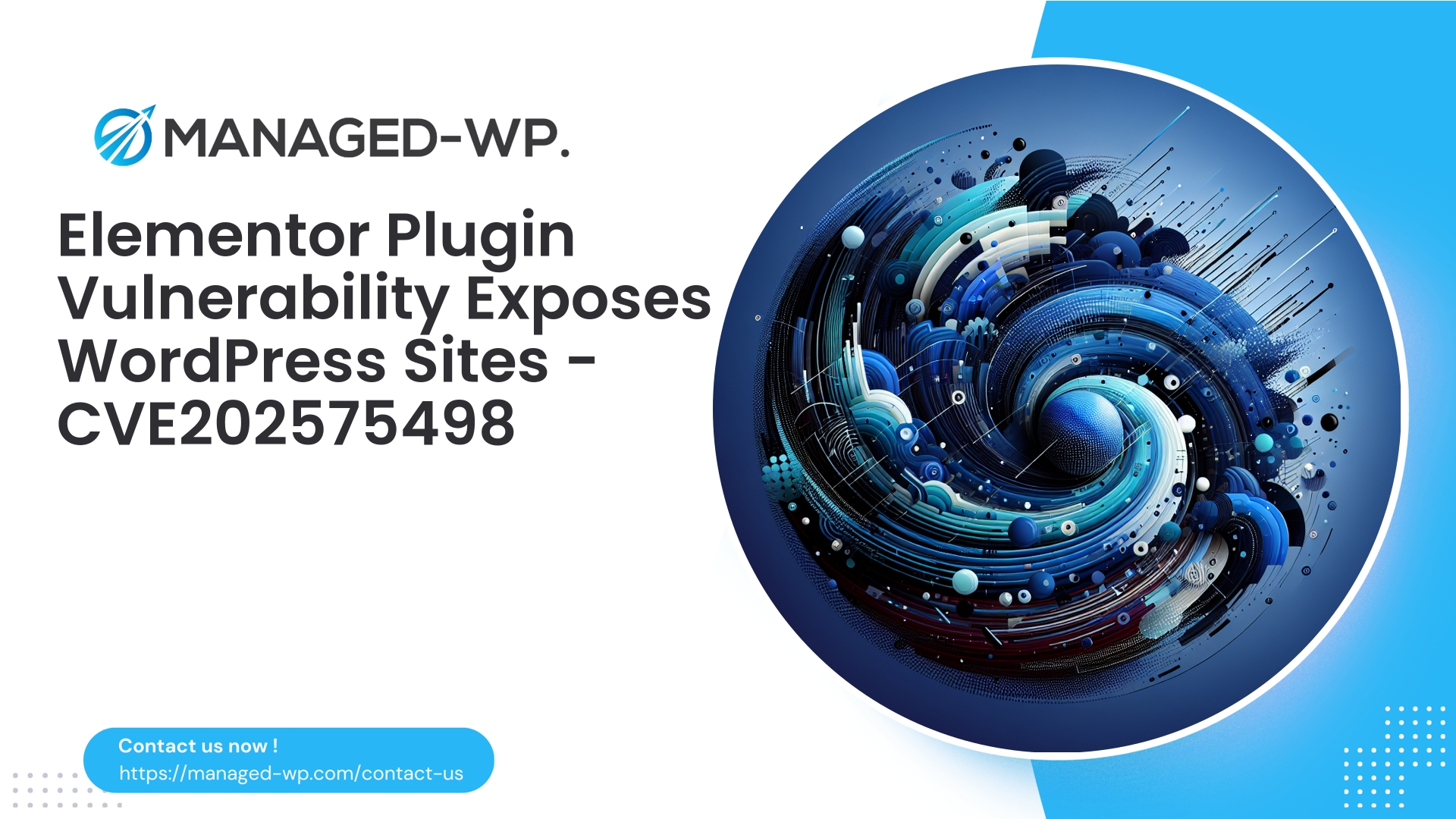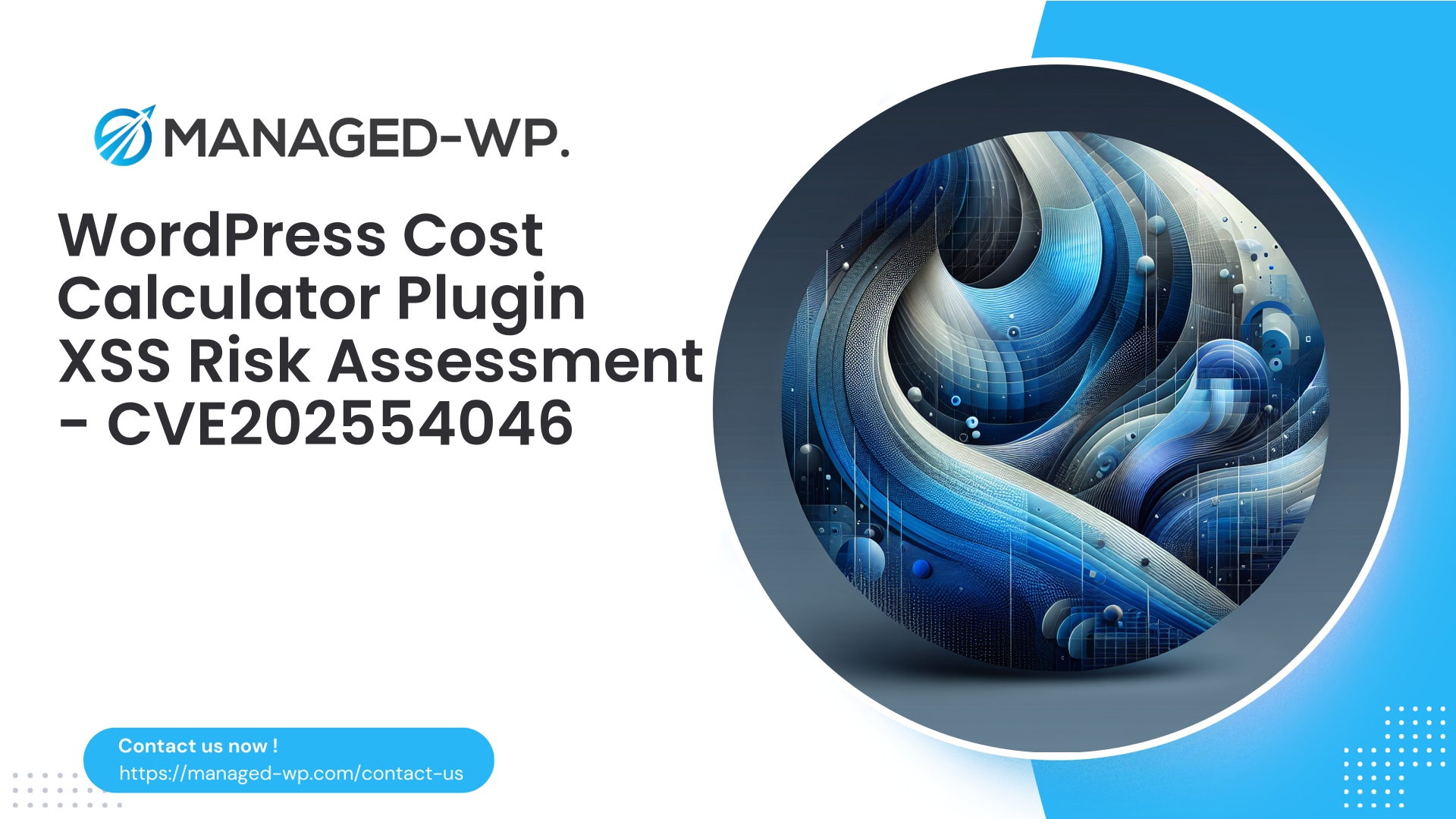| Plugin Name | Type of Vulnerability | CVE Number | Urgency | CVE Publish Date | Source URL |
|---|---|---|---|---|---|
| Exclusive Addons for Elementor | Remote Code Execution (RCE) | CVE-2025-7498 | High | 2025-08-06 | Link |
Critical Security Alert: Stored Cross-Site Scripting Vulnerability in Exclusive Addons for Elementor Plugin (≤ 2.7.9.4)
With WordPress powering nearly half of the internet, it remains a lucrative attack vector for cybercriminals—particularly through plugin vulnerabilities. Managed-WP security analysts have identified a stored Cross-Site Scripting (XSS) vulnerability affecting the Exclusive Addons for Elementor plugin, versions up to and including 2.7.9.4. This flaw permits authenticated users with Contributor-level access or higher to inject malicious scripts via the plugin’s countdown feature, endangering both site integrity and visitor data.
In this briefing, we provide a clear breakdown of the vulnerability, its implications, risk factors, and actionable guidance to secure your online assets. Staying informed and proactive is vital to defending your WordPress environment against ongoing threats.
Understanding the Vulnerability: What is Stored Cross-Site Scripting (XSS)?
Stored XSS is a dangerous injection flaw where malicious scripts are permanently embedded within a website’s data—such as databases—and executed in the browsers of unsuspecting visitors. Unlike reflected or DOM-based XSS, this persistent variant automatically activates on page load.
Within the Exclusive Addons for Elementor plugin, the countdown widget improperly handles input sanitization, enabling users with at least Contributor privileges to embed harmful JavaScript or HTML. Visitors to affected pages unknowingly run this code, potentially resulting in:
- Session hijacking and credential theft
- Redirection to fraudulent or malware-distributing websites
- Injection of deceptive or malicious advertising
- Exfiltration of sensitive data such as cookies or user information
Vulnerability Details: Exclusive Addons for Elementor (≤ 2.7.9.4)
- Plugin: Exclusive Addons for Elementor
- Affected Versions: 2.7.9.4 and earlier
- Patch Released: Version 2.7.9.5
- Vulnerability Type: Stored Cross-Site Scripting (XSS)
- Minimum Required Permission: Contributor or higher
- CVSS Score: 6.5 (Medium Severity)
- Disclosure Date: August 6, 2025
- CVE Identifier: CVE-2025-7498
Why This Vulnerability Is a Serious Concern
Though exploitation requires contributor access — seemingly limiting risk — the potential consequences demand immediate attention:
1. Insider and Account Compromise Risks
Contributor accounts often represent trusted personnel or external collaborators. Should these accounts be abused or hijacked, the attacker gains direct injection capability to the site, elevating the breach’s severity.
2. Persistent and Wide-Reaching Attack Vector
The malicious payload persists in the site database, delivered indiscriminately to all visitors of pages embedding the vulnerable countdown element, magnifying impact.
3. Facilitated Social Engineering Attacks
Attackers can craft convincing phishing or drive-by exploits embedded directly in your site content, increasing their chance of stealing credentials or spreading malware.
4. Compliance and Reputation Fallout
Security incidents of this nature compromise visitor trust, risk regulatory penalties (e.g., GDPR violations), and inflict reputational harm.
Exploit Mechanism: Countdown Feature Misuse
This vulnerability arises from inadequate validation and escaping of input data entered into the countdown widget’s settings:
- A Contributor adds or modifies a countdown timer shortcode/widget, injecting malicious JavaScript or HTML.
- The plugin saves this unsafe input directly into the database without proper filtering.
- Any visitor loading the affected page unwittingly executes the embedded malicious script.
- Attackers leverage this foothold to conduct the aforementioned malicious activities.
Real-World Impact and Risks
- Session Hijacking: Takes over user sessions to impersonate or escalate privileges.
- Malware Delivery: Redirects users to malicious payloads or malvertising campaigns.
- Data Exfiltration: Steals passwords, cookies, or private information.
- SEO Spam: Injects spam content damaging search rankings and user trust.
- Site Defacement: Displays unauthorized or harmful content that harms brand integrity.
Who Should Take Immediate Action?
- Websites running Exclusive Addons for Elementor ≤ 2.7.9.4.
- Sites with multiple users assigned Contributor or higher privileges without strict oversight.
- Organizations relying on countdown features provided by this plugin without recent updates.
- Administrators and security teams without timely patch management practices.
Recommended Mitigation Steps
1. Update to Secure Version
Immediately upgrade the plugin to version 2.7.9.5 or later where this vulnerability is resolved.
WordPress Dashboard → Plugins → Exclusive Addons for Elementor → Update to 2.7.9.5+2. Review and Limit User Privileges
Ensure Contributor and above roles are assigned only to verified and trustworthy users. Minimize unnecessary privileges.
3. Inspect Countdown Components
Audit all countdown timers and related shortcodes for suspicious or injected scripts, removing any malformed or unexpected content.
4. Implement Input Validation and Output Filtering
Where possible, reinforce plugin security by using security plugins or Web Application Firewalls (WAFs) that detect and block harmful payloads.
5. Monitor Access Logs and Behavior Analytics
Establish routine checks on server logs and user activity to identify anomalous actions that could indicate exploitation attempts.
6. Deploy Managed WordPress Security Solutions
Adopt firewall and security scanner services designed to proactively identify and mitigate plugin vulnerabilities including XSS flaws.
Severity Assessment: Medium But Not To Be Overlooked
With a CVSS score of 6.5, this vulnerability is categorized as medium severity due to required permissions and exploit complexity. However, stored XSS can magnify damage via persistent malicious code and targeted social engineering. Managed-WP experts emphasize that even medium-rated issues demand prompt attention to maintain sound security postures.
Best Practices to Maintain Robust Plugin Security
- Keep WordPress core, themes, and plugins fully updated.
- Assign only necessary user roles and minimize Contributor or higher accounts.
- Enforce strong password policies and two-factor authentication (2FA).
- Regularly audit plugin sources and security disclosures.
- Use security platforms with virtual patching and threat intelligence.
- Back up your site frequently and before applying updates.
The Importance of Layered Security for WordPress
Layered defenses are essential: beyond patching, continuous security monitoring, Web Application Firewalls, malware scanning, and incident response form the cornerstone of a resilient WordPress infrastructure. WAFs especially can detect and block exploit attempts preemptively, reducing vulnerability exposure windows significantly.
Free Essential Security Features for Your WordPress Site
While timely updates are crucial, Managed-WP offers a no-cost, managed firewall plan encompassing:
- Regular firewall rule updates maintained by security experts
- Unlimited bandwidth protection
- Automated malware scanning
- Comprehensive mitigation against top OWASP vulnerabilities
This free plan provides a solid security foundation to help protect your site from plugin vulnerabilities like the one disclosed here.
Learn more and activate your free protection plan:
https://my.wp-firewall.com/buy/wp-firewall-free-plan/
Advanced Protection and Managed Security Options
For organizations requiring enhanced security, Managed-WP provides Standard and Pro packages featuring:
- Auto malware removal tools
- Custom IP blacklisting and whitelisting
- Detailed monthly security reports
- Virtual patching for zero-day exploits
- Dedicated security management and expert support
Whether you manage a single site or multiple installations, a managed, layered security approach from Managed-WP keeps you ahead of emerging threats.
Conclusion: Take Immediate Steps to Secure Your WordPress Site
The stored XSS vulnerability impacting Exclusive Addons for Elementor plugin versions ≤ 2.7.9.4 underscores a critical security principle: plugin vulnerabilities—even those exploitable only by authenticated contributors—pose significant risks to website integrity, data privacy, and user trust.
Mitigate your exposure by:
- Upgrading the plugin to 2.7.9.5 or above immediately
- Carefully reviewing and controlling contributor privileges
- Utilizing Managed-WP’s firewall and security scanning features
- Maintaining ongoing vigilance through logging and monitoring
WordPress security is an ongoing commitment: stay updated, stay alert, and implement layered defenses to protect your assets and visitors.
Strengthen Your WordPress Security Now — Absolutely Free
Activate Managed-WP’s free security plan today to enjoy managed firewall protection, unlimited bandwidth, OWASP Top 10 mitigation, and automated malware scanning—all designed to safeguard your WordPress site against critical attacks.
Don’t wait for exploitation—take control of your site’s security:
➡️ https://my.wp-firewall.com/buy/wp-firewall-free-plan/
This analysis and report have been prepared by Managed-WP security specialists committed to delivering authoritative, actionable advice that empowers you to maintain a secure and resilient WordPress environment.



















